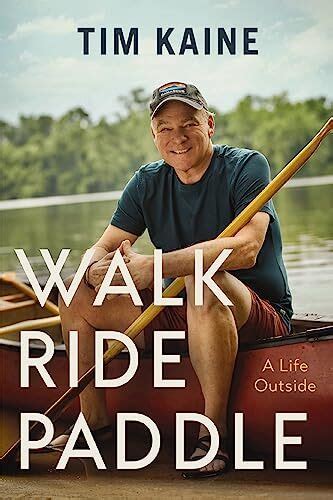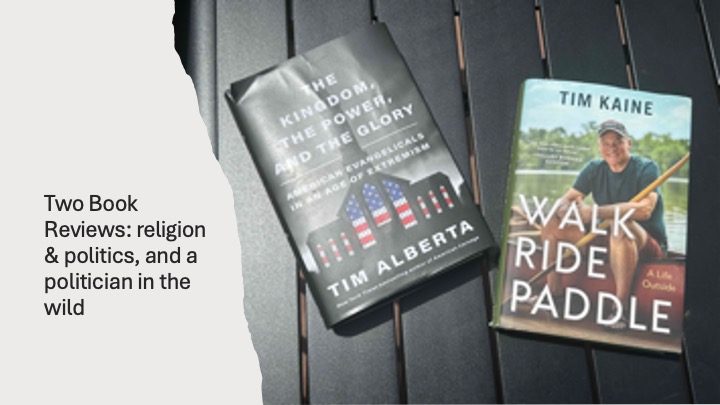Tim Alberta, The Kingdom, the Power, and the Glory: American Evangelicals in an Age of Extremism

(New York: Harper, 2023), 493 pages including index and notes. No photos.
Tim Alberta is a journalist and the son of a preacher. His father grew his congregation in southeast Michigan to a megachurch status. Having spent his formative years in this church, Alberta had always appreciated coming home and visiting. But during his father’s funeral, in which he spoke, he realized the church was in trouble. Many of the leaders and members disliked his reporting on the American political scene. He was attacked while at the funeral. He wondered what had happened to the people he had known and loved and who had nurtured him.
Those who attacked Alberta after his father’s funeral were the same people who questioned Bill Clinton’s suitability for the Presidency. Yet, they ignore or overlook the obvious and blatant sinfulness of Donald Trump. Alberta wonders what happened to them and the church. Both seem to have abandoned the teachings of Jesus for the political rhetoric of the nation. Alberta set out to explore American evangelical Christianity. Much of what he found was troubling.
In this book, Alberta visits numerous churches, along with colleges and conferences, around the country. He starts with Liberty University in Lynchburg, Virginia. When possible, he speaks to the pastors and leaders of movements along with those involved or formerly involved. He attends churches who messages are mostly political, who flaunt COVID guidelines, glorify guns, and speak of owning the libs. He questions what happened to Jesus’ teachings about loving one’s enemies.
Alberta also visits with those who found themselves pushed out of churches because of their loyalty to Christ alone. These include Russell Moore, who had been one of the leaders of the Southern Baptist Convention, along with the new pastor at his father’s former church. He discusses the “hidden” evangelical issues around sexual abuse, introducing his readers to Beth Moore and Rachel Denhollander. He even looked at how other countries are drawn toward totalitarian dictators, drawing on the work of Miroslav Volf and Cyril Hovorun. Maybe it shouldn’t be surprising that the church is under attack, not just in America, but around the world.
Alberta doesn’t provide easy answers for how the church can stop being enamored with political idols. Perhaps this is best. The church, as he points out, isn’t in our hands. We belong to Christ’s church, and he controls it, not us. The only hope found in this book was in Alberta’s description of a few churches, such as the one his father had served, which had once been a megachurch. After losing significant members to other churches on the political right, they have found a stronger and more vibrant ministry even with fewer people.
I would make one minor correction. Alberta speaks of the Evangelical Presbyterian Church being further to the right, theologically and otherwise, to the Presbyterian Church in America (page 438). I disagree. The PCA doesn’t even have an option for women leadership, compared to the EPC which does allow women to be in ordinated positions.
This is a long book, but I recommend it for understanding how today’s church is caught up in the political sphere. It may be considered a companion to Katherine Stewart’s The Power Worshippers: Inside the Dangerous Rise of Religious Nationalism. May we remember that the church doesn’t exist to serve political causes. We serve Christ, who is the King of King.
Tim Kaine, Walk, Ride, Paddle: A Life Outside

(Harper Horizon, 2024), 367 pages plus an insert of color photos.
Having recently turned 60 years old, Tim Kaine, a Senator from Virginia, who ran as the Vice-Presidential candidate with Hillary Clinton in 2016, set out to explore his adopted Virginia from the ground. 2019 also marked his 25th year in public service. He had served as the mayor of Richmond, as lieutenant governor and governor of the state, as well as a United States Senator. His goal was to hike the Appalachian Trail in the state, ride a bicycle along the state’s portion of the Blue Ridge Parkway along with the Skyland Drive, and paddle a canoe the length of the James River, which runs across the middle of the state.
Walking
While the Senate was in recess in 2019, Kaine spent his free time hiking the 559 miles of the Appalachian Trail in the state. Beginning in Harper’s Ferry, West Virginia, he heads south to the North Carolina border, just south of Damascus, Virginia. A quarter of the “AT” is in Virginia, a state which has more miles than any other. Having hiked this trail from the other direction, I found myself reliving my own experiences. Many of the shelters were familiar as were places like Woods Hole Hostel, which I stayed at before it was even open. The owners who had purchased the farm shared with me their dream of having a hostel along the trail. Like him, I also had some less than fond memories such as the thick growth of poison ivy along the trail south of I-77.
I also realized the differences between his hike in 2019 and my hikes in the mid-1980s. There are far more people hiking the trail these days and more hostels. Furthermore, there is a whole network of people willing to pick up hikers. When I hiked the trail, if you needed to get somewhere, you hitchhiked.
Kaine hikes the trail with a variety of people. There are friends from Richmond, classmates, along with his wife and kids, who join him for sections of the trail. As he walked south, we learn about Kaine’s life and his great love for the outdoors. Kaine is from Kansas City and fell in love with camping as a child in the Midwest. He jokes that while he never edited the Harvard Law Review as a student, he set the record for the most nights outdoors.
While at Harvard, he met his wife, Anne. Interestingly, she spent part of her years growing up in the Governor’s mansion. Her father was the first Republican governor of Virginia since Reconstruction. He was also the governor who stopped Virginia’s fight against school integration, a decision which ended his political career. With family roots in Roanoke, Anne shared her love of the Virginia Mountains with Kaine.
Throughout the book, the reader catches a glimpse of Kaine’s faith. He often sings hymns, recalls portion of scripture, and has an abiding faith in Jesus Christ. In addition, the book allows him to share what is happening politically in the nation, as the times he must run back to D.C., to take care of business.
As I have always said, backpacking is a great equalizer of people. It doesn’t matter how much money is in the bank when you are hiking. There’s no place to spend it. The reader learns how Kaine, as a senator, had to struggle to find water or to stay dry, issues all hikers endure.
Bicycling
The second portion of Kaine’s odyssey involves riding the Blue Ridge Parkway and Skyland Drive on a bicycle. Here, in 2020, he joins several of his college and law school classmates for the ride. A few years earlier, another of the group had hosted them for a ride across Iowa. The group hires a guide who drives a van with a trailer. And they stay in hotels and lodges along with the way, with their guide setting up their lunch at overlooks on the road. They enjoy good breakfasts (as opposed to the oatmeal along the AT) and nice dinners. This is the quickest section of the three-prong journey and is completed in seven days.
2020 is also the first year with COVID. Kaine spends much time discussing the problems with the disease (he and his wife both suffer from it and later, he finds himself dealing with long-COVID). In addition, he discusses the problems in the nation with the rioting after the unprovoked killings of African Americans.
Paddling
In 2021, after the turmoil of the election and the attack on the capitol, Kaine sets out on his last leg, paddling the length of the James, from the edge of the mountains to where it flows into the Chesapeake Bay. Like his AT hike, this is portion of the trail is done in sections. Kaine mostly camps in state parks along the river, or stays in hotels and B&Bs, while paddling a section each day. His canoe is an Old Town, which his in-laws hand given him and his wife shortly after they married.
As he travels, the reader learns the history of the river and about Kaine’s work as governor with many river projects that enhanced the waterway. The upper parts including portaging around dams and running rapids. Drawing on Earl Swift’s, Journey on the James, which describes his paddle in the 1990s, we see how the river has both been cleaned over the past quarter century. Cities and towns have transformed the river from an industrial wasteland to a pleasant park and riverwalks. The most difficult rapids are at the fall line in Richmond. This section, Kaine runs in a raft. After Richmond, the river widens. Kaine continued paddling the Old Town open canoe until the last day, when he transferred to a sit-on-top sea kayak which he and his son paddled to the end of the river at Fort Monroe.
Along the way, Kaine informs his readers about Native Americans in Virginia, as well as the role African Americans played in the state. The river’s dark history includes bringing many enslaved Africans up its waters to be sold into slavery. Kaine trip ends in the waters of Civil War battles and the site of the United States’ largest naval base.
Recommendation
I really enjoyed this book. As a Vice-Presidential candidate, Kaine seemed to me to lack pep. Reading this, I understand he’s probably more of an introvert. Yet, he gets things done. I wish this book had been available earlier, as I am now impressed with him and his grasp of the state which he serves. I would recommend this to Virginians and to those interested in the outdoors or the more personal side of politicians.


Jeff, I wanted to stop by to say thank you for your kind thoughts and condolences on Eddies passing.
I do hope to get back to regular blogging soon.
In the meantime, my thanks again to you.
All the best Jan
My condolences for all your going through with Eddies’ death. While I never met him, I appreciate all the work he did to keep the diabetic community informed.
As I think you know, I have read the Alberta book. I also read his other one (the one he caught so much crap for), “American Carnage.” If you have not seen or heard him interviewed, I would recommend going to YouTube and searching for his interview on CBS Sunday Morning (which you obviously never watch – ha!). He speaks well and I have since heard him on a number of podcasts. I really appreciate what he has offered in both of these books.
The Kaine book looks great. Although I was/am not a fan of Hillary, I really like him and remember wishing, when he debated Pence in 2016, that it was the two of them running for POTUS rather than Clinton and Trump.
Yes, I remember your review. I haven’t read “American Carnage.”
I thought the same thing in 2016!
Two Tims.
Both books sound interesting. Kaine seems like an interesting guy. The camera doesn’t always seek out THAT sort of interesting. Spectacle is not the same thing.
It is interesting that both share the same name!
As usual, I enjoy your reviews. The Tim Kaine book–one I’d never read because I am beyond tired of politics, but have read several about people who journeyed the Appalachian Trail. So, I appreciate you reading this for me!
About 1/2 of the book was on his hiking the AT. Having hiked the trail, I have also read a number of books from others who have hiked it. While there was a lot of politics in the book, it wasn’t overwhelming. It was more a “love letter” to his adopted state of Virginia.
I already have the Katherine Stewart book tagged at my digital library. I think I’ll have to add the Tim Alberta book, as well. It’s actually the second time this week I’ve heard it recommended.
I think Alberta is a good journalist. I also liked Stewart’s book.
It sounds like you found 2 good books.
Both are good and they are very different!
Both of these books sound excellent, Jeff. I am really drawn to the first book because it fascinates me that some church groups and organizations turn a blind eye to Trump and all of his wrongdoings.
I think there will be a judgment on the church for those who use the church for political power.